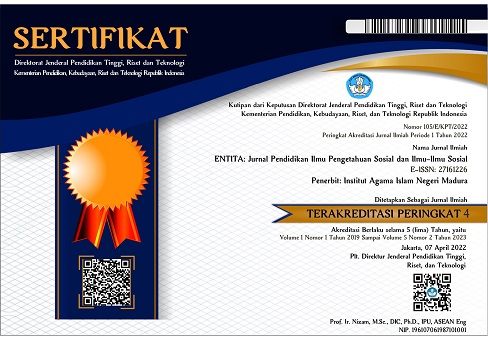The Influence of The TASC (Thingking Actively In A Social Context) Model Using Whatsapp Social Media on Online Learning Materials for Classification of Land Capability in the Emergency Period of the Covid 19 Pandemic
 Abstract views: 266
,
Abstract views: 266
,
 PDF downloads: 199
PDF downloads: 199
Abstract
This study aims to determine the effect of the Tasc model using WhatsApp social media on online learning for Land Capability Classification Analysis during the COVID-19 pandemic emergency. The method used in this study is an experimental method with a quasi-experimental type using a factorial design. The samples in this study were students of class X IPS 1 and class X IPS 2. The results of this study were analyzed in stages, namely: data description, prerequisite test, and hypothesis testing. The prerequisite tests carried out are the normality test of the data distribution, the homogeneity of variance test, and the t test. The results showed that after the learning was carried out and the post-test was given to the experimental class and the control class, the results obtained ttest > t 𝑡𝑎𝑏𝑒𝑙 indicating was accepted . Where that the learning outcomes of students on the material elements of hadith using the TASC learning model are better than conventional learning. Where the class that uses the TASC model seems enthusiastic about sending information on the Whatsapp group because the TASC learning model helps students to construct their own knowledge and makes it easier for students to understand the classification of land capability.
Downloads
References
Arikunto, Suharsimi. (2005). Research Management . Jakarta: Rineka Cipta
Armati, & Yanrizawati. (2020). Analysis of the Use of Online Media in Mathematics Learning in terms of Student Learning Independence in Class XI of SMAN 1 Koto Balingka. Journal of Educational Exacts, 4 . https://doi.org/https://doi.org/10.24036/jep/vol4-iss2/507 .
Astuti, M & Solikhah, I. (2020). Teacher Perception in Teaching English for SMP in Klaten Regency During Covid-19 Outbreak. IJOTL-TL: Indonesian Journal of Language Teaching and Linguistics, 6(1) , 1–13. https://doi.org/https://doi.org/10.30957/ijoltl.v6i1.645 .
Barkah, A., Mardiana, T., & Japar, M. (2020). Analysis of the implementation of learning methods during the covid-19 pandemic in PKN subjects. Pedagogy: Journal of Educational Research, 7(2) , pp. 123-136. DOI: 10.25134/pedagogy.v7i2.3426.
Bentley, Y., Selassie, H., & Shegunshi, A. (2012). Design and evaluation of student-focused eLearning. Electronic Journal of E-Learning, 10(1), 1–12. https://doi.org/10.1007/s10648013-9243-1
Kurniasari, Asrilia, Fitroh Setyo Putro Pribowo, and Deni Adi Putra. (2020). Analysis of the Effectiveness of the Implementation of Learning From Home (Bdr) During the Covid19 Pandemic , 6, no. 3.
Kuntarto, E. & Asyhar, R. (2017). Development of Blended Learning Learning Model in Learning Design Aspect with Online Social Media Platform to Support Student Lectures . Unja repository. Https://repository.unja.ac.id/cgi/users/home?screen=EPrint::View&eprintid=626
Sadikin, A., & Hamidah, A. (2019). Online Learning Amid the Corona Outbreak. BIODIK: Scientific Journal of Biology Education, 6(2), 187–192. https://doi.org/10.17509/t.v6i2.20887
Santi, Dewi Tri. (2020). Utilization of Social Media in Teaching and Learning Activities during the Covid-19 Period at Mi Al-Iman Way Jepara. As-Salam I Vol. IX No. 2 , p. 145 – 12.
Seeley, C. (2011, November). The TASC wheel supports a honey bee challenge . Primary Science, 120, 14.
So, S. (2016). Mobile instant messaging support for teaching and learning in higher education. Internet and Higher Education, 31, 32–42. https://doi.org/10.1016/j.iheduc.2016.06.001
Su, B., Bonk, CJ, Magjuka, RJ, Liu, X., & Lee, S. (2005). The importance of interaction in web-based education: A program-level case study of online MBA courses. Journal of Interactive Online Learning, 4(1), 1–19. https://doi.org/ISSN1541-4914
Wallace, B. (2015). Thinking actively in a social context . http:// http://tascwheel.com/ ?page_id=289 .
Copyright (c) 2022 ENTITA: Jurnal Pendidikan Ilmu Pengetahuan Sosial dan Ilmu-Ilmu Sosial

This work is licensed under a Creative Commons Attribution-NonCommercial 4.0 International License.
ENTITA: Jurnal Pendidikan Ilmu Pengetahuan Sosial dan Ilmu-Ilmu Sosial operates an Open Access policy under a Creative Commons Non-Commercial 4.0 International license. Authors who publish with this journal agree to the following terms:
- The copyright of the received article once accepted for publication shall be assigned to the journal as the publisher with licensed under a

- Journal is able to enter into separate, additional contractual arrangements for the non-exclusive distribution of the journal's published version of the work (e.g., post it to an institutional repository or publish it in a book), with an acknowledgement of its initial publication in this journal.
- Journal is permitted and encouraged to post their work online (e.g., in institutional repositories or on their website) prior to and during the submission process, as it can lead to productive exchanges, as well as earlier and greater citation of published work (see The Effect of Open Access).
- Here is Copyright Transfer Form that author can download and send to OJS during submission.

















